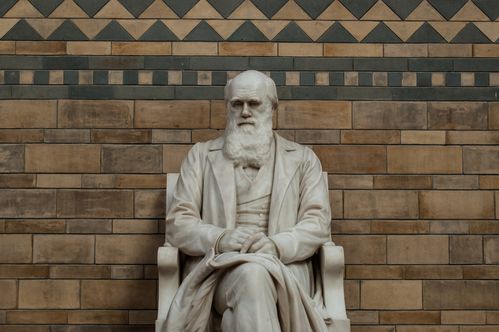Darwin’s Dirty Secret Lives On

By John G. West and Eric M. Wallace
A recent book on evolutionary theory fails to reckon with the social side of natural selection.
In 1904, thousands of indigenous people were brought to the St. Louis World’s Fair to be put on public display. Scientists offered them as examples of lower stages of human evolution. Some were even presented to the public as “missing links” between humans and apes.
Two years later, an African named Ota Benga was exhibited in a cage next to an orangutan in the Bronx Zoo primate house. The display attracted hundreds of thousands of visitors. It also drew protests from Black and white clergy. Black minister James Gordon attacked the presentation for propagandizing on behalf of Darwinian evolution, which he regarded as “absolutely opposed to Christianity.”
“Neither the Negro nor the white man is related to the monkey, and such an exhibition only degrades a human being’s manhood,” he declared.
Scientific and cultural elites, meanwhile, saw nothing wrong.
Leading evolutionary biologist Henry Fairfield Osborn of Columbia University praised the zoo exhibit, while The New York Times complained it was “absurd to make moan over the imagined humiliation and degradation” of Benga. The Times took special umbrage at Gordon’s skepticism of evolution: “The reverend colored brother should be told that evolution, in one form or other, is now taught in the text books of all the schools, and that it is no more debatable than the multiplication table.”
Only recently have many members of the scientific community begun to grapple with evolutionary biology’s disturbing past. Last year, the science journal The American Naturalist published an article acknowledging that “the roots of evolutionary biology are steeped in histories of white supremacism, eugenics, and scientific racism.”
This fraught history helps explain why biologist Joseph L. Graves Jr. reports in his recently published book that he was “the first African American to earn a PhD in evolutionary biology.”
The work is titled A Voice in the Wilderness: A Pioneering Biologist Explains How Evolution Can Help Us Solve Our Biggest Problems (Basic Books). Part autobiography and part polemic, it recounts the author’s powerful personal story of how he overcame the obstacles of racism to pursue a successful career in biology. His various struggles—including the death of his younger brother from AIDS contracted as a hospital doctor—are raw and affecting.
But A Voice isn’t simply about Graves’s backstory. It also addresses the broader social, political, and cultural problems that America faces. The author offers a way to meet these formidable challenges: by leaning into evolutionary theory and its wide-ranging implications.
(This excerpt is from Christianity Today. see Full article here)
A recent book on evolutionary theory fails to reckon with the social side of natural selection.
In 1904, thousands of indigenous people were brought to the St. Louis World’s Fair to be put on public display. Scientists offered them as examples of lower stages of human evolution. Some were even presented to the public as “missing links” between humans and apes.
Two years later, an African named Ota Benga was exhibited in a cage next to an orangutan in the Bronx Zoo primate house. The display attracted hundreds of thousands of visitors. It also drew protests from Black and white clergy. Black minister James Gordon attacked the presentation for propagandizing on behalf of Darwinian evolution, which he regarded as “absolutely opposed to Christianity.”
“Neither the Negro nor the white man is related to the monkey, and such an exhibition only degrades a human being’s manhood,” he declared.
Scientific and cultural elites, meanwhile, saw nothing wrong.
Leading evolutionary biologist Henry Fairfield Osborn of Columbia University praised the zoo exhibit, while The New York Times complained it was “absurd to make moan over the imagined humiliation and degradation” of Benga. The Times took special umbrage at Gordon’s skepticism of evolution: “The reverend colored brother should be told that evolution, in one form or other, is now taught in the text books of all the schools, and that it is no more debatable than the multiplication table.”
Only recently have many members of the scientific community begun to grapple with evolutionary biology’s disturbing past. Last year, the science journal The American Naturalist published an article acknowledging that “the roots of evolutionary biology are steeped in histories of white supremacism, eugenics, and scientific racism.”
This fraught history helps explain why biologist Joseph L. Graves Jr. reports in his recently published book that he was “the first African American to earn a PhD in evolutionary biology.”
The work is titled A Voice in the Wilderness: A Pioneering Biologist Explains How Evolution Can Help Us Solve Our Biggest Problems (Basic Books). Part autobiography and part polemic, it recounts the author’s powerful personal story of how he overcame the obstacles of racism to pursue a successful career in biology. His various struggles—including the death of his younger brother from AIDS contracted as a hospital doctor—are raw and affecting.
But A Voice isn’t simply about Graves’s backstory. It also addresses the broader social, political, and cultural problems that America faces. The author offers a way to meet these formidable challenges: by leaning into evolutionary theory and its wide-ranging implications.
(This excerpt is from Christianity Today. see Full article here)
Posted in Book Review
Posted in Dr. Eric M. Wallace, Dr. John G. West, Evolution, Science, Christianity, Darwinian Evolution, Apes, Charles Darwin, Maxists, Hilter, Nazis, White Supremacy, Creation, biblical worldview, biologist, Black Americans
Posted in Dr. Eric M. Wallace, Dr. John G. West, Evolution, Science, Christianity, Darwinian Evolution, Apes, Charles Darwin, Maxists, Hilter, Nazis, White Supremacy, Creation, biblical worldview, biologist, Black Americans
Recent
The Heart of the Matter Is the Matter of the Heart
February 14th, 2026
People of Color can also steal…Duh?
February 14th, 2026
The Monroe Doctrine Isn’t Outdated — It’s Vital for American Security
January 5th, 2026
Defining Racism “UP”
January 4th, 2026
The Voting Rights Act Should Protect Voting—Not Perpetuate Fear
January 4th, 2026
Archive
2026
2025
February
March
July
September
October
November
2024
January
Cartoon 01/01/24Cartoon 01/02/24Claudine Gay Betrayed the American Values of My Black Elders to Exploit White GuiltCartoon 01/03/24Cartoon 01/05/24Cartoon 01/06/24Cartoon 01/07/24Cartoon 01/08/24We need a David, not a SaulCartoon 01/13/24Cartoon 01/09/24Cartoon 01/10/24Cartoon 01/11/24Cartoon 01/14/24Cartoon 01/12/24What Happens to a King Deferred? A ReduxCartoon 01/15/24Cartoon 01/16/24The Good Guys with Guns Part 1Cartoon 01/17/24America Works. DEI Doesn’t.Cartoon 01/18/24Cartoon 01/23/24Good Guys with Guns Part 2Cartoon 01/19/24Cartoon 01/21/24Cartoon 01/22/24Cartoon 01/24/24Cartoon 01/26/24Cartoon 01/25/24Cartoon 01/27/24
February
Cartoon 02/04/24Cartoon 02/03/24Cartoon 02/02/24Cartoon 02/01/24Cartoon 01/31/24Cartoon 01/28/24Cartoon 01/29/24We’ve Been Gay(ed) Part 1Cartoon 02/05/24Cartoon 02/06/24Cartoon 02/07/24Cartoon 02/08/24Cartoon 02/13/24Cartoon 02/12/24Cartoon 02/09/24Cartoon 02/11/24Cartoon 02/10/24Cartoon 02/19/24'Black America at Crossroads’ of Culture Wars as Presidential Election LoomsWe’ve Been Gay(ed) Part 2Cartoon 02/18/24Cartoon 02/17/24Cartoon 02/16/24Cartoon 02/15/24Cartoon 02/14/24Cartoon 02/22/24Cartoon 02/21/24Cartoon 02/20/24America Needs a “Black Wives Matter” Movement To Rebuild the Black FamilyCartoon 02/23/24Cartoon 02/24/24Cartoon 02/25/24Cartoon 02/26/24Cartoon 02/27/24

No Comments